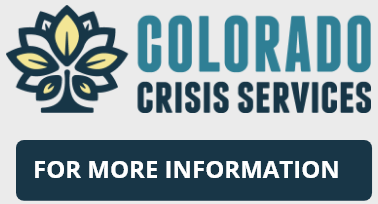
PREVENTION HOME CRISIS CONTACTS PREVENTION SERVICES WHO ARE WE?
Centennial’s Prevention Services are creative, innovative ways of increasing awareness about behavioral health, building communities of support and promoting life and wellness skills. These services are comprised of a variety of already existing programs as well as introducing time limited services with theme based education and prevention specific to physical and mental health well being.
Use the color coded icons below to support your search for Centennial Prevention services
designed to address your school/community goals.

Adult Mental Health First Aid

Mental Health First Aid is a skills-based training course that teaches participants about mental health and substance-use issues. In the Mental Health First Aid course, you learn risk factors and warning signs for mental health and addiction concerns, strategies for how to help someone in both crisis and non-crisis situations, and where to turn for help. Versions specific to law enforcement and first responders is available.
Audience: Adults
Applied Suicide Intervention Skills Training (ASIST)

LivingWorks ASIST is a two-day face-to-face workshop featuring powerful audiovisuals, discussions, and simulations. You will learn how to prevent suicide by recognizing signs, providing skilled intervention, and developing a safety plan to keep someone alive. Two knowledgeable, supportive trainers will guide you through the course, ensuring your comfort and safety.
Audience: Adults
Botvin Lifeskills

These evidence-based LifeSkills Training (LST) programs help youth with the confidence and skills necessary to successfully handle challenging situations. LST has been proven to reduce alcohol, tobacco, marijuana, and other drug abuse. In addition, research on LST demonstrated reductions in violence, delinquency, and most recently, prescription and opioid misuse among middle school aged-youth.
Audience: 3rd-12th Grade
Counseling on Access to Lethal Means (CALM)
Counseling on Access to Lethal Means can help you feel prepared to talk with people about means safety. Reducing access to lethal means, such as firearms and medication, can determine whether a person at risk for suicide lives or dies. This course is about how to reduce access to the methods people use to kill themselves. It covers who needs lethal means counseling and how to work with people at risk for suicide—and their families—to reduce access.
Audience: Adults
COMET

COMET™ (Changing Our Mental and Emotional Trajectory) Training recognizes our rural values of neighbor helping neighbor and communities being their own best resource—especially when concerned about another’s emotional and mental well-being. Attendees learn a conversational guide and the importance of being “the other person,” practicing the COMET intervening questions, and planning how to use COMET to engage in conversations about another’s well-being. The COMET Training gives participants a natural way to engage a friend, a neighbor or an acquaintance when they are concerned.
Audience: Adults
Hazelden Lifelines® Prevention

Building Knowledge and Skills to Prevent Suicide educates school faculty, parents, and students on the facts about suicide and their respective roles as suicide “”preventers.”” This program is designed to help everyone in the community recognize when a student is at potential risk of suicide and understand how and where to access help. This program uses language to reflect today’s best practices and youth culture.
Audience: 5th-12th Grade & Adults
Hazelden Lifelines® Postvention

Responding to Suicide and Other Traumatic Death provides best-practice education for everyone in the community on how to appropriately respond to suicide and other traumatic deaths that profoundly affect the school population. This edition covers all grades and includes information regarding developmental differences at specific ages.
Audience: 5th-12th Grade & Adults
QPR
QPR stands for Question, Persuade, and Refer — the 3 simple steps anyone can learn to help save a life from suicide. People trained in QPR learn how to recognize the warning signs of a suicide crisis and how to question, persuade, and refer someone to help.
Audience: Adults
Riding the Waves

Riding the Waves promotes lessons that address healthy emotional development, depression, and anxiety. The curriculum’s overarching goal is to build the emotional skills within children to prevent suicide at its earliest stages.
Audience: 5th Grade
Rise Above Colorado

Rise Above Colorado offers interactive, engaging lessons to educate and equip teens with knowledge and skills to prevent substance misuse. The resources are designed to complement and reinforce Rise Above’s positive community norms campaign efforts, showcasing the hope and positivity among youth in our state.
Audience: Everyone
Safe2Tell

Information is available for schools, parents and teachers and provides insight on bullying, substance use, and other concerns impacting youth. Students may use Safe2Tell for advice or to report a concern.
Audience: Everyone
School Care & Recovery

In the wake of a traumatic event, schools have the opportunity to provide necessary trauma-recovery support in ways that promote mental health wellness for the affected individuals as well as for the entire school community. Centennial Prevention Staff are also available to provide guidance, materials and support to school staff and community partners to develop postvention protocols and practices.
Audience: School Communities
Sources of Strength – Elementary

As a universal classroom curriculum, Sources of Strength Elementary not only incorporates solid Social Emotional Learning content, but includes a robust focus on mental health and proactive prevention for elementary schools.
Audience: Kindergarten-6th Grade
Sources of Strength – Secondary

With a mission to provide the highest quality evidence-based prevention for suicide, violence, bullying and substance abuse, Sources of Strength utilizes training, supporting, and empowering both peer leaders and caring adults to impact their world through the power of connection, hope, help and strength. This program highlights upstream prevention and focuses on changing the community within the school to promote positive life skills.
Audience: 6th -12th Grade
teen Mental Health First Aid

teen Mental Health First Aid teaches teens how to identify, understand and respond to sign of mental health and substance use challenges among their friends and peers. Teens will learn the skills they need to have supportive conversations with their friends and how to get help from a responsible and trusted adult.
Audience: 10th-12th Grade
Too Good for Drugs
Too Good for Drugs is a universal prevention education program designed to mitigate the risk factors and enhance protective factors related to alcohol, tobacco, and other drug (ATOD) use. The lessons introduce and develop social and emotional skills for making healthy choices, building positive friendships, developing self-efficacy, communicating effectively, and resisting peer pressure and influence.
Audience: 3rd grade – High School
Too Good for Violence – Social Perspectives

TGFV – Social Perspectives develops and applies social and emotional learning skills for conflict resolution, bullying prevention, anger management, and respect for self and others. In middle school, students learn the negative consequences of aggressive behavior and practice healthy menthods to manage stress and frustration.
Audience: 5th, 6th, and 7th Grades
Trauma-Sensitive Practices Within the School Setting

Facilitated conversations, workshops and/or consultations to introduce and promote trauma-sensitive school communities with tailored supports for awareness, prevention planning, trauma programming, classroom-based strategies, and staff self-care based on individual school directed assessments.
Audience: Staff & Caregivers Kindergarten – 12th Grade









